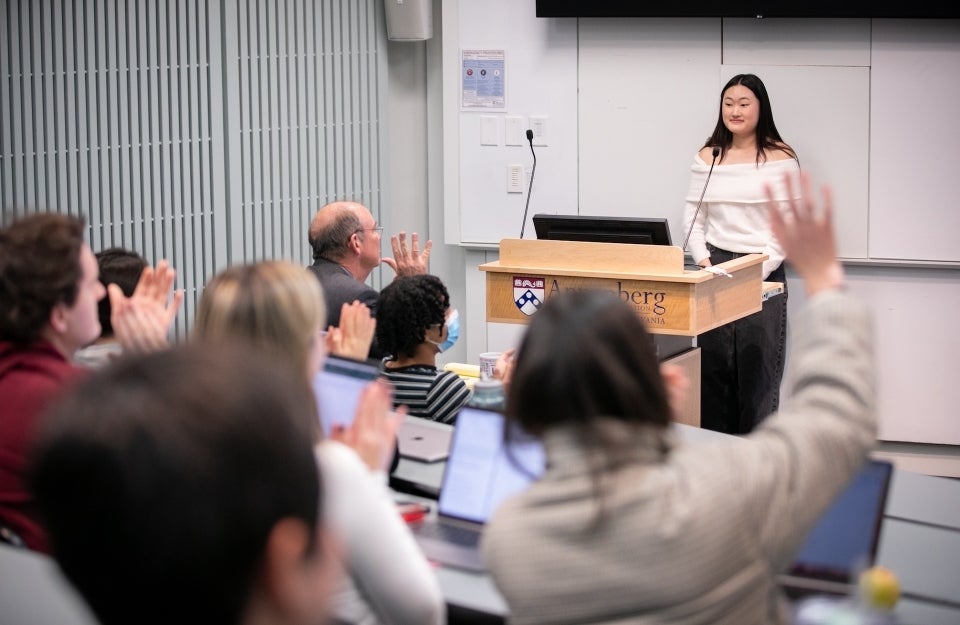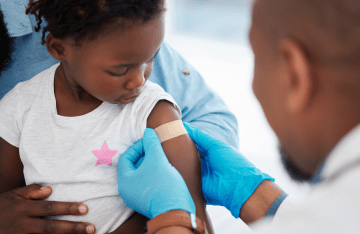Penn Students Get Convention Access in Extraordinary Political Times
Undergrads who attended the Republican or Democratic convention this summer are breaking down their experiences during the "Conventions, Debates, and Campaigns" course taught by Annenberg lecturers David Eisenhower, Marjorie Margolies, and Craig Snyder.

Penn student Jean Park delivers a presentation on differences in social media strategies between the campaigns of former President Donald Trump and Vice President Kamala Harris. (Photo: Scott Spitzer)
Eight days after completing a summer internship at CNBC’s breaking news desk, fourth-year Penn student Isabel Engel flew to Chicago to attend the Democratic National Convention, where she met Nancy Pelosi during a taping of the Politics War Room podcast, joined a group of Penn students asking Tim Walz a question, told Pennsylvania Gov. Josh Shapiro how his 2022 campaign inspired her to get involved with voting in Philadelphia, and connected with a presidential historian who is now advising on her honor’s thesis.
“I grew up right outside D.C. and both my parents have worked on Capitol Hill in various capacities, so I’ve experienced politics for much of my life,” says Engel, a Communication and Political Science major in the College of Arts and Sciences, “but the energy at the [DNC] was unlike anything I’d ever experienced.”
Annenberg School for Communication lecturers David Eisenhower and Marjorie Margolies have been taking Penn undergraduate students to the Democratic and Republican conventions every presidential cycle since 2000—except for 2020, due to the COVID pandemic—as part of their Conventions, Debates, and Campaigns course, offered every four years.
“We are the only university that does this, only one anywhere,” says Eisenhower, director of Annenberg’s Institute for Public Service and host of "The Whole Truth with David Eisenhower" on PBS.
He says he loves seeing students come alive having an experience he had at their age. In 1968, at age 20, he attended the nominating convention for Richard Nixon, his soon-to-be father-in-law. Eisenhower had first met Julie Nixon at the 1956 convention, which re-nominated his grandfather, Dwight D. Eisenhower.

“It’s an institution which at any moment could spring to life, and it did this year,” Eisenhower says. He accompanied students to the RNC, and Margolies, a former broadcast journalist and Democratic congresswoman, went to the DNC. Co-teacher Craig Snyder, former chief of staff to Republican U.S. Sen. Arlen Specter and president of the World Affairs Council of Philadelphia, went to both. Margolies and Snyder are both Penn alums.
Margolies says she recently spoke with a journalist who went to the 2004 convention as a Penn student, and that when asking alumni what they remember most about their experience at Penn, it’s usually this course. She shares a story from that convention that’s indicative of the kind of happenstance yet extraordinary encounters students can have: At a fundraiser, Margolies approached a man—a state senator at the time—and asked if he would talk to the class.
It was Barack Obama.
Enthusiasm and Gratitude
Engel says that two months after the convention, people are still excited to hear about her experience. She recently led a high school voter press conference for the Philadelphia youth vote initiative #VoteThatJawn and says she’s had people come up to her asking about the DNC. “People are still floored that Penn sent us.”
Students are still writing about and presenting on various topics related to their convention experience, including optimism, religious rhetoric, and gender in the 2024 election compared to 2016. And students are still learning eye-popping information about their professors.
“I told her about the class yesterday,” Snyder casually said before class recently, while he and a few students talked to Penn Today.
“Told who?” inquired one student. “Harris,” he replied. The three students and three professors began talking over one another: “Oh my God, what’s happening?!” “Wait, what?” “That’s ridiculous.” “The whole time we were there was just like, how are we getting access to this and how are we lucky enough to have these professors?”
During class, Snyder explained that he attended a gathering of Republicans for Harris in Washington Crossing, Pennsylvania the day before. He encouraged students to watch Harris’ speech, calling it “the most concerted effort in any of our lifetimes—any of us, with all our different ages—to build a cross-partisan coalition to win an election.”
In a previous class, he showed the students old clips of Trump speaking, illustrating that the former president’s opposition to free trade, immigration, and a militarized American role in the world stretches back decades. The day after speaking to Harris, Snyder played older clips of her for the class, to show how she has evolved to represent the people covered by whichever role she had at a given time.
‘Parties for the Parties’
Thirteen Penn students taking the class attended the DNC and six went to the RNC in Milwaukee, including fourth-year Communication majors Isabel Sweeney and Elizabeth Collins.
“It was a very, very interesting experience through and through, also very interesting timing, because it was two days after Trump got shot, so there was a lot of heightened security,” says Sweeney, who is from Riverside, Connecticut. Collins chimes in, “Heightened everything. Heightened rhetoric, heightened passion.”

Collins, who is from Phoenix, Arizona, said that most mornings, the students went to panels organized by Eisenhower, the USC Annenberg School for Communication and Journalism, and Penn’s Annenberg School, featuring journalists, political scientists, and others. Eisenhower says this is the first time partnering with USC Annenberg for the conventions.
The students also heard from a few people who were at the July rally where Trump got shot, Sweeney says. They travel the country going from rally to rally, and at the convention, they wore the same outfits they could be seen wearing in the background on video of the attempted assassination.

After mentioning that she got a picture with NBC journalists Savannah Guthrie and Kristen Welker, Collins comments that being exposed to the journalism industry “and just seeing that live, with the expertise of our professors and our students, was just so formative and made me really proud of all the work I’ve done at Penn.”
Having grown up and gone to school in “a bit of a bubble,” Sweeney says, made the reaction to Trump’s first appearance at the convention one of the event’s most memorable moments for her.
Sweeney says the crowd’s attitude was: “America’s going to be great again. This is a birthday party, a concert, a sports game. We’re back in business.”
“These are parties for the parties,” Eisenhower says of both conventions.
More recently, students have been presenting on election-related topics, contextualizing their convention experience with data and other research. Lex Gilbert, a fourth-year majoring in Communication and Gender, Sexuality, and Women’s Studies who co-founded Penn’s Disabled Coalition, spoke about disability and accessibility. They explain that this year’s DNC included the first ramp to the floor in convention history as well as sign language interpreters, and that halfway through the convention, closed captions moved from side screens to the main screen.
Classmates gush over the quality of the photos that Jean Park, a second-year Communication major, took at the DNC and other events, including the Harris-Walz rally in Philadelphia. Park spoke about differences in social media approaches between the Harris and Trump campaigns, and shares that at the convention, she met the person running the Kamala HQ account on TikTok.
“I think my favorite thing about Annenberg,” Engel says, “is the hands-on experience and the experiential learning that you gain, whether it’s from a professor like Al Hunt who literally teaches from journalistic experience, or Eisenhower and Craig and Marjorie, or Kim Woolf, who did her Ph.D. here and is now teaching all of the thesis students. I think going to the convention was an incredible way to continue that hands-on experience and see, oh my gosh, this is what a degree in communications can really do for me.”



